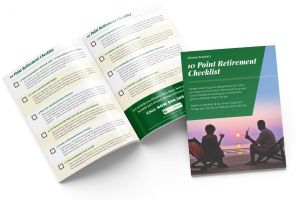How Can I Transition My Business Value into Money I Can Use?
Have your question answered on the Money Wisdom Question Series!
Today’s question is a crucial topic for many of our clients who are business owners or have significant assets tied up in a business: How can I convert the value of my business into income for my retirement years?
In this week’s Money Wisdom Question Series, join Nicholas J. Colantuono, CFP® as he shares what to consider when planning for the sale of a business to generate retirement income.
Understanding the Tax Implications
Deciding whether to sell or keep your business can be a difficult choice. If you choose to sell, it could come with significant tax implications, including taxes on the value of the sale. On the other hand, if you decide not to sell and pass away while still owning the business, its value now becomes part of your taxable estate. In that case, your estate would need to settle the tax bill based on the value of the business.
Transitioning to Income
Selling a business and transitioning that money into an income stream could be the largest check you ever sign. Since the money or asset is no longer tied to a retirement account, your next move is to place it into a brokerage account where it will generate taxable interest and dividends each year. Whether that money is invested in the market, earning dividends and appreciating in value, or sitting in a bank account accruing interest, you’ll be responsible for paying taxes on it.
The Importance of Long-Term Planning
In addition to succession planning, selling your business is about understanding the taxes you’ll pay on the value of that sale and then creating a long-term strategy to minimize those taxes. There’s a lot to consider, especially when transitioning from a business asset to other assets, such as cash, investments, or secure vehicles. When you sell a business, you’re converting it into assets, and you’ll need to ensure those assets continue to work as hard for you as the business did, while lasting as long as you do.
To start this process, you need a retirement income plan. With the guidance of a financial professional, a tailored financial plan can show you where you are now and how you can take appropriate action to get where you want to be.
Download Now
10-Point Retirement Checklist
Here’s a checklist of our most important things you can do, to help you retire strong.

Information presented in our podcasts is considered current as of the created date. Over time, some information presented may become stale. We recommend you consult with your Financial Professional before making any changes based on information contained here.
Johnson Brunetti is a marketing name for the businesses of JB Capital and JN Financial.
Investment Advisory Services offered through JB Capital, LLC. Insurance Products offered through JN Financial, LLC.
The guarantees provided by any type of insurance contract are based on the claims-paying ability of the insurance company.
Related Resources
-
Working with a Financial Advisor
You wouldn’t let just anyone manage your money or guide you through one of life’s most pivotal milestones. Knowing who to trust with your retirement can make all the difference. With so much on yo… -
How Much Should I Keep in Cash During Retirement?
Having cash on hand can provide a sense of stability and peace of mind at any stage of life. However, in retirement, holding too much cash may limit your long-term returns and erode your purchasin… -
How Much Money Do I Need to Retire Comfortably?
You’re not alone in wondering how much you need to save for a comfortable retirement. After all, you’ve worked hard to reach this milestone, and there’s peace of mind in knowing you’ve taken all t… -
Social Security Myths Debunked
With so many rules and choices involved, it’s easy to feel overwhelmed or intimidated by Social Security. As a key source of retirement income, this decision deserves careful consideration, which … -
How Does the Big Beautiful Bill Affect Me?
On July 4, 2025, the One Big Beautiful Bill Act (OBBBA) was signed into law, bringing significant changes to the U.S. tax code. But what does it mean for you? What actions should you consider? And… -
How Do I Know If My Financial Advisor is Doing a Good Job?
There’s plenty of discussion and debate around today’s question: “How can I tell if my financial advisor is doing a good job?” Instead of relying on preconceived notions, we believe the best way t… -
What’s the Right Medicare Plan for Me?
There is a lot to consider when choosing the right Medicare plan: How often do you visit the doctor? Do you have any chronic conditions? Do you take prescription drugs regularly? Answering these q… -
What Happens to My Retirement Accounts When I Pass Away?
What happens to your retirement accounts after you die depends largely on your personal situation and legacy planning goals. Are you single or married? Do you have children? Do you want to leave m… -
Can I Still Retire Comfortably If I’m Behind on Saving?
You’ve worked hard to reach retirement, and you deserve to enjoy it comfortably. But what if you discover you’re behind on your savings goal? In this week’s Money Wisdom Question Series, Nichol… -
What’s the Best Age to Start Taking RMDs?
Is it better to take your required minimum distribution (RMD) sooner rather than later? While the IRS determines when you must begin taking RMDs, you may benefit from taking them earlier. An RM…

